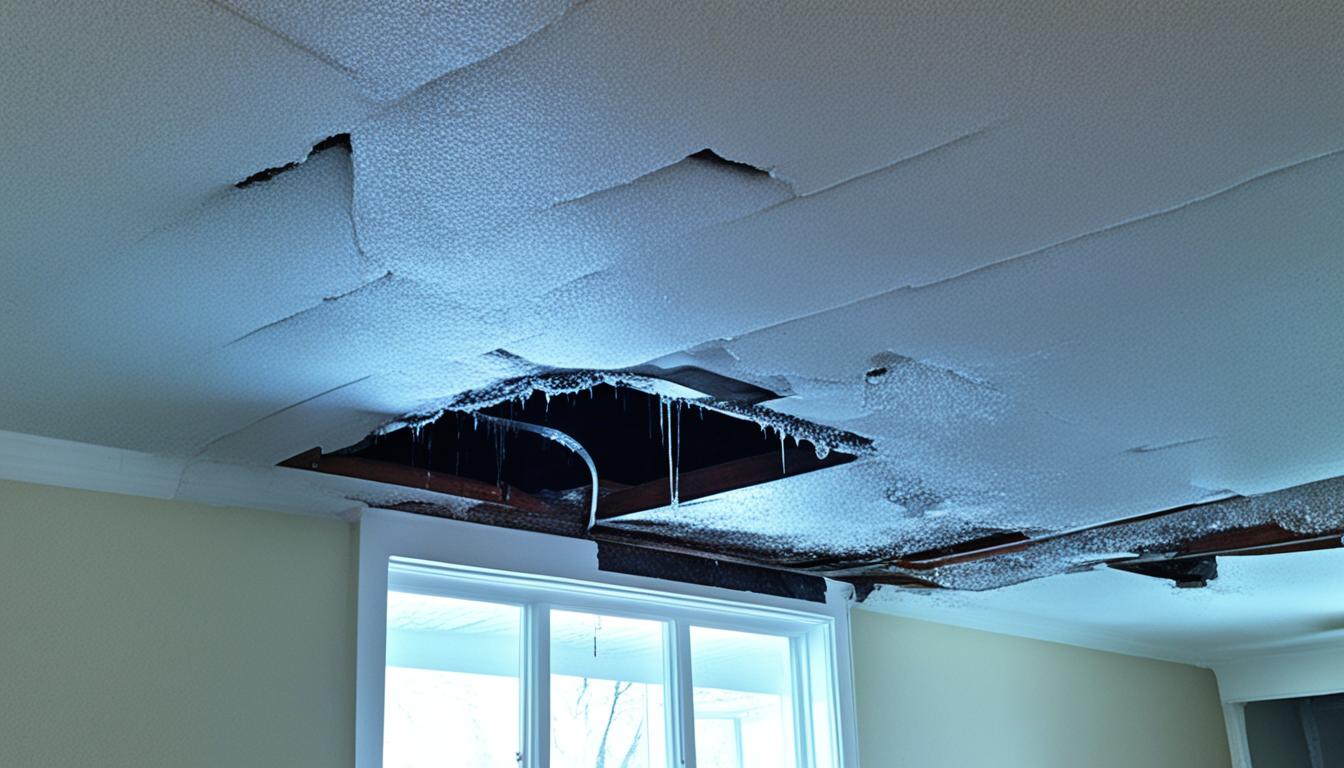Welcome to our informative article on water damage! Understanding the common causes of water damage is crucial for every homeowner. Whether you’ve experienced water damage before or want to prevent it from happening in the future, this article will provide you with valuable insights and tips.
In this section, we will delve into the most common cause of water damage, equipping you with the knowledge to protect your property effectively. By identifying the root of the problem, you can take proactive measures to mitigate the risk and safeguard your home.
Key Takeaways:
- Understanding the most common cause of water damage is essential for preventing it.
- By addressing the root cause, you can take proactive steps to protect your property.
- Stay tuned for the next section where we explore plumbing issues as a leading cause of water damage.
- Regular maintenance and timely repairs can help prevent water damage incidents.
- Don’t underestimate the importance of protecting your home from water damage.
Plumbing Issues: A Leading Cause of Water Damage
When it comes to water damage in homes, plumbing issues are a major culprit. Leaks and burst pipes can wreak havoc on your property, causing extensive damage and costly repairs. Understanding the common plumbing problems that can lead to water damage is crucial for preventing such incidents.
One of the primary plumbing issues that homeowners face is leaks. Whether it’s a slow drip or a sudden gush, even a small leak can result in significant water damage over time. Leaky pipes, faucets, and toilets can go unnoticed for weeks or months, leading to structural damage, mold growth, and compromised indoor air quality.
Burst pipes are another serious plumbing problem that can cause extensive water damage. Freezing temperatures, excessive water pressure, and aging pipes are common causes of bursting. When a pipe bursts, it can release hundreds of gallons of water into your home, flooding rooms and causing structural damage.
To address and prevent plumbing-related water damage, it’s essential to take the following steps:
- Regularly inspect your plumbing system, including pipes, faucets, and toilets, for any signs of leaks or corrosion.
- Immediately repair any leaks or drips to prevent further damage. Consider hiring a professional plumber for complex repairs.
- Insulate exposed pipes in cold areas of your home to prevent freezing and bursting during frigid weather.
- Monitor your water pressure and install a pressure regulator if necessary to prevent excessive pressure on your plumbing system.
- Replace old or deteriorating pipes to minimize the risk of bursting and water damage.
- Consider installing leak detection devices or smart water sensors that can alert you to potential leaks or bursts.
Taking these preventive measures can help you avoid the headache and expense of dealing with water damage caused by plumbing issues. By staying vigilant and addressing plumbing problems promptly, you can protect your home and preserve its value for years to come.
Weather-related Water Damage: The Impact of Natural Disasters
Natural disasters, such as flooding and severe storms, can have devastating effects on homes, leading to extensive water damage. When faced with these weather-related events, it is crucial to understand the potential risks and take measures to mitigate them.
Flooding is a particularly common consequence of severe weather conditions. Excessive rainfall, rising water levels, or a combination of both can overwhelm drainage systems and infiltrate homes, causing significant damage to structures, furnishings, and personal belongings. Storms, including hurricanes and tornadoes, can also lead to water damage through roof leaks and broken windows.
To minimize the impact of weather-related water damage, it is important to implement preventive measures. Consider the following steps:
- Ensure proper drainage around your property by regularly maintaining gutters and downspouts. This will help divert water away from your home.
- Inspect your roof for any signs of damage or wear and promptly address any issues. Properly maintained roofing is crucial in preventing water intrusion during storms.
- Seal any potential entry points for water, such as cracks and gaps, in your home’s exterior walls and foundation. This can help prevent water seepage during heavy rainfall.
- Invest in a sump pump and install it in your basement or crawl space. This device can help remove water in the event of a flood.
- Elevate valuable items and electrical equipment off the ground in flood-prone areas of your home. This can minimize potential damage in case of water intrusion.
By taking these precautions, you can significantly reduce the risk of weather-related water damage and minimize the financial and emotional toll associated with such events. Remember to stay informed about weather alerts and updates in your area, and consider investing in appropriate insurance coverage for added peace of mind.
| Type of Natural Disaster | Impact on Water Damage |
|---|---|
| Flooding | Extensive water infiltration into homes, causing structural damage and destruction of belongings. |
| Severe storms | Roof leaks, broken windows, and water intrusion can lead to significant water damage. |
| Hurricanes | High winds and storm surges can result in widespread flooding and property damage. |
| Tornadoes | Intense winds and flying debris can cause structural damage and water intrusion. |
Appliance Failures: Unexpected Culprits of Water Damage
When it comes to water damage in homes, the first things that come to mind are often plumbing issues or weather-related incidents. However, it’s important not to overlook the potential for appliance failures to cause significant damage as well. Home appliances, such as washing machines, dishwashers, and water heaters, can malfunction and result in water damage if not properly maintained.
In this section, we will discuss common appliance failures that can lead to water damage and provide guidance on preventive measures. By understanding the risks associated with faulty appliances, you can take proactive steps to protect your home and avoid costly water damage incidents.
One of the most common appliance failures that can result in water damage is a malfunctioning washing machine. A leaking or overflowing washing machine can release large amounts of water, causing extensive damage to floors, walls, and nearby furniture. Regularly inspecting the hoses, checking for loose connections, and ensuring proper drainage can help prevent such failures.
Dishwashers are another appliance that can contribute to water damage if not properly maintained. Leaking hoses, damaged seals, or clogged drains can all lead to water escaping the dishwasher and seeping into the surrounding area. Regularly inspecting and cleaning the dishwasher, checking for leaks, and addressing any issues promptly can help prevent water damage.
Water heaters are essential for providing hot water, but they can also be a source of water damage if they malfunction. A leaking water heater tank or a faulty pressure relief valve can result in water damage and even flooding. Regular maintenance, such as checking for leaks, flushing the tank, and replacing faulty components, can help prevent such failures.
By staying vigilant and addressing potential appliance failures, you can significantly reduce the risk of water damage in your home. Regularly inspecting and maintaining appliances, promptly repairing any issues, and being aware of the signs of impending failure can help you prevent unexpected water damage incidents.
Conclusion
In conclusion, understanding the most common causes of water damage is essential for safeguarding your property. By addressing plumbing issues, preparing for weather-related water damage, and maintaining your appliances correctly, you can greatly reduce the risk of experiencing costly water damage incidents.
When it comes to plumbing issues, promptly fixing leaks and regularly inspecting and maintaining your pipes can prevent potential water damage. Additionally, consider insulating your pipes during cold weather to prevent burst pipes and ensure the proper functioning of your plumbing system.
Preparing for weather-related water damage involves taking preventive measures such as clearing gutters and downspouts, installing flood barriers or sandbags in flood-prone areas, and sealing any cracks in your home’s foundation. Consider investing in a sump pump to efficiently remove excess water during heavy rains or floods.
To prevent appliance failures leading to water damage, make sure to regularly inspect and service your appliances. Check for any signs of wear and tear, leaks, or faulty connections. Replace worn-out hoses, connectors, or parts to avoid potential water damage incidents.
Remember, taking proactive steps to protect your home and minimize the potential impact of water damage can save you from expensive repairs and the hassle of dealing with the aftermath. Stay vigilant, address issues promptly, and maintain your property to keep it safe and secure from water damage.
FAQ
What are the most common causes of water damage in homes?
The most common causes of water damage in homes include plumbing issues such as leaks and burst pipes, weather-related events like flooding and storms, and appliance failures.
How can I prevent water damage from plumbing issues?
To prevent water damage from plumbing issues, it is important to regularly inspect your pipes, fix any leaks or drips promptly, and ensure proper insulation during cold weather to prevent frozen pipes. Professional plumbing maintenance inspections can also help identify and address potential issues before they escalate.
What steps can I take to protect my property from weather-related water damage?
To protect your property from weather-related water damage, consider installing flood barriers or using sandbags during storms, clearing gutters and downspouts of debris regularly, and sealing any cracks or gaps in your home’s foundation. Additionally, you may want to invest in a sump pump or backflow prevention device to mitigate the risk of flooding.
How can I prevent water damage caused by appliance failures?
To prevent water damage caused by appliance failures, it is crucial to maintain your appliances regularly. This includes checking hoses and connections for signs of wear or leaks, cleaning your washing machine’s lint trap, and ensuring your water heater’s pressure relief valve is functioning correctly. Additionally, following the manufacturer’s guidelines for maintenance and replacement can help prevent unexpected malfunctions.







